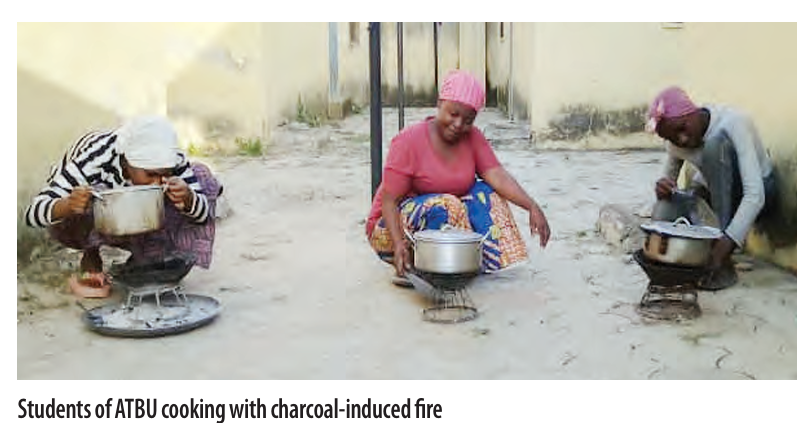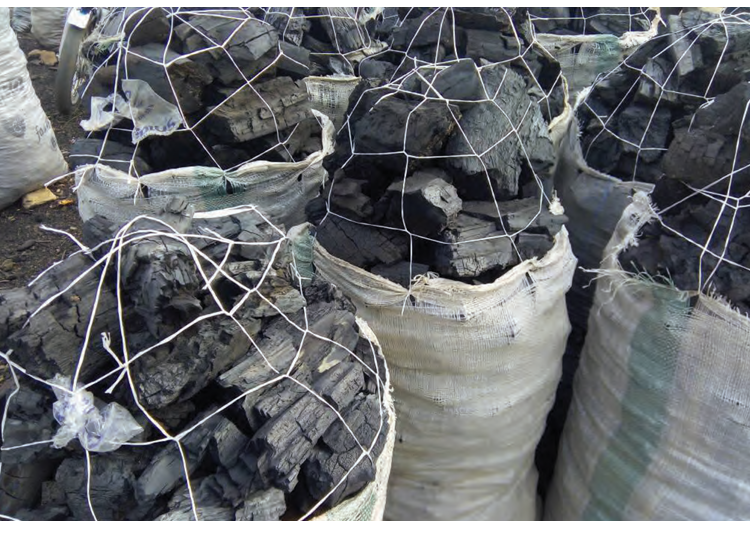The rising cost of cooking gas and kerosene has pushed many Nigerian students to rely on charcoal for cooking, triggering a chain of environmental and health concerns.
While charcoal offers certain advantages, such as affordability and availability, its increased use has serious implications for deforestation, pollution, cleanliness and environmental sustainability.
Data from Global Forest Watch indicate that between September 29 and October 6 this year, about 1,649 instances of deforestation were reported in Nigeria. And, this covers about 20 hectares of land which is equivalent to about 200,000sq metres of land.
At the helm of the reasons for cutting down tress is charcoal production and legal and illegal logging, agriculture and climate change, though to an average level.
Recently, the price of cooking gas rose sharply due to global energy supply disruptions and inflation, while kerosene, a more traditional fuel for cooking, similarly became too expensive for many low-income earners in Nigeria, including students who naturally rely on stipends from parents and or, guardians.
For instance, as at the time of filing this report, a kilogramme of cooking gas sold for N1,500 in Bauchi metropolis. A litre of domestic purpose kerosene when available went for about N1,900 and above. Most filling stations stock out of the commodity. This further complicated price stability for kerosene.
This has left many with little choice but to turn to charcoal – a cheaper and other more readily available alternatives. A market survey conducted on the price of charcoal indicates that a bag sells for N6,000.
For students living on a tight budget, the daily struggle to afford cooking fuel has become an increasing burden. Several university and polytechnic students in Bauchi shared their experiences with this challenge.
“I used to buy gas, but now it’s just too expensive,” Aisha Mohammed, a student of Federal Polytechnic, Bauchi, said.

She added, “I’ve had to switch to charcoal, even though it’s not easy to use. It gets messy, and the smoke sometimes irritates my throat.”
Another student, Ibrahim Abdullahi, echoed Aisha’s sentiment. While he prefers using kerosene due to its convenience, the price increase has forced him to resort to charcoal.
“I don’t like using charcoal because it’s smoky, but it’s what I can afford. Kerosene is just too expensive now,” he lamented.
Despite their complaints about the soot and smoke from burning charcoal, the students agree that it is more cost-effective.
“Charcoal lasts longer than kerosene. With a little quantity, you can cook a full meal, while kerosene finishes too fast,” a student of Abubakar Tafawa Balewa University (ATBU), Bauchi, Zainab Usman said.
While charcoal may be more affordable, experts warn that its increased use could have serious environmental consequences. Charcoal is produced by burning wood, which leads to deforestation. As more people rely on charcoal for cooking, trees are being cut down at an alarming rate to meet the growing demand.
This poses a significant threat to Nigeria’s already fragile ecosystems, particularly in the northern region where desertification is a serious concern.
A forestry expert at the Federal Polytechnic, Bauchi, Dr. Adamu Waliki, emphasised the vital role trees play in environmental protection.
He said, “Trees provide oxygen, absorb carbon dioxide, and play a crucial role in improving air quality. They also serve as habitats for both humans and animals and help regulate the weather.
“When deforestation occurs, all these benefits are lost, leaving communities vulnerable to environmental problems like soil erosion and desertification,” he said.
Waliki warned that the surge in charcoal use could accelerate deforestation, with devastating consequences for local communities.
“If people keep cutting down trees for charcoal, we’ll see a rapid advancement of desertification, which will affect agriculture, water supply, and overall living conditions,” he declared.
The issue of deforestation in Nigeria is closely tied to economic hardship. Many young people, faced with unemployment and rising living costs, resort to cutting down trees to produce and sell charcoal as a means of survival.
Waliki highlighted the importance of addressing the root causes of the problem.
“The government needs to create job opportunities for the youth to prevent them from engaging in deforestation. Most of those involved in charcoal production do so because they have no employment. By providing jobs, the government can reduce deforestation and protect our environment,” he said.
In addition to job creation, Waliki called for policies that promote afforestation – planting trees to replace those that have been cut down.
“Afforestation programmes are critical if we want to restore our forests and prevent further environmental degradation,” he added.
Despite the environmental and health risks associated with using charcoal, many students feel trapped by the high cost of cleaner fuels like gas and kerosene.
“It’s not that we don’t care about the environment,” Aisha Mohammed said. “But when you can’t afford gas or kerosene, you don’t have a choice but to use what’s available. It’s a matter of survival.”
While some students have explored alternatives such as using electric hot plates, this option is not feasible for everyone due to fluctuations in power supply in many areas. “We can’t rely on electricity for cooking because we hardly have stable power,” Ibrahim Abdullahi noted. “That’s why charcoal seems like the only option, even though it’s not ideal.”
The shift to charcoal, while understandable, poses a dilemma for both individuals and the environment. Charcoal provides an affordable, long-lasting heat source, but its widespread use is contributing to deforestation, which will have long-term consequences for communities across Nigeria.
Addressing the growing dependence on charcoal requires a multifaceted approach. On one hand, there is an urgent need to make cleaner fuels like gas and kerosene more affordable and accessible to low-income households and students. On the other hand, there is a pressing need for environmental conservation efforts, particularly afforestation programmes, to mitigate the damage caused by deforestation.
Experts like Waliki believe that with proper planning and investment, Nigeria can find a balance between meeting the energy needs of its people and protecting its forests. “The solution lies in a combination of education, job creation, and sustainable energy policies,” he concluded. “Only then can we ensure a future where both our people and our environment thrive.”





